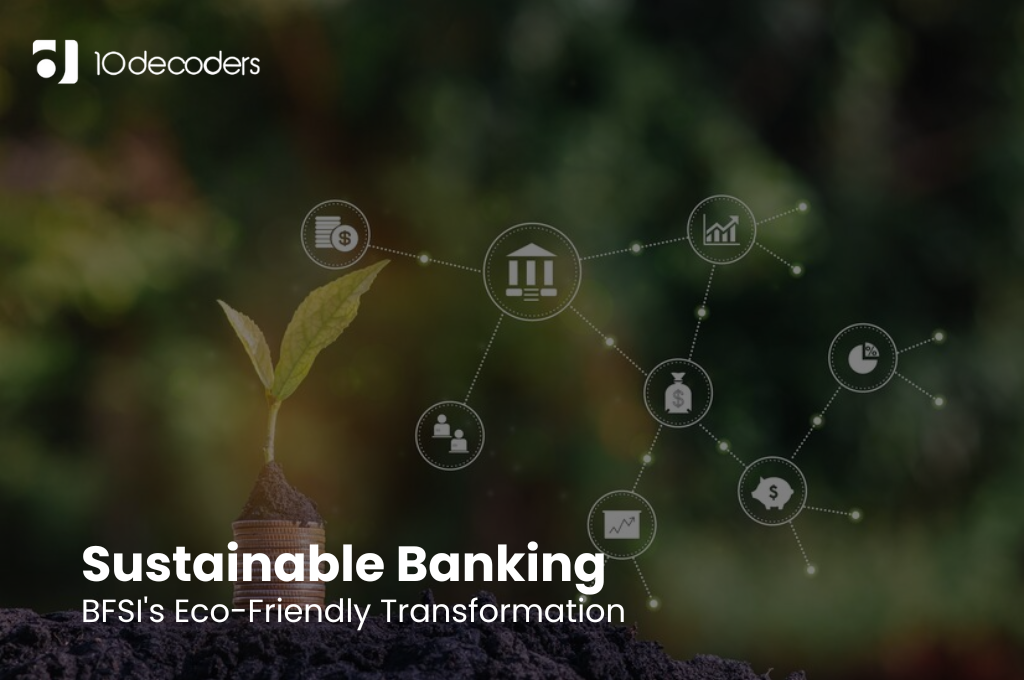Sustainable Banking: BFSI's Eco-Friendly Transformation
The winds of change are sweeping through the Banking, Financial Services, and Insurance (BFSI) sector, carrying with them the scent of fresh possibilities and a renewed sense of purpose. This metamorphosis is fueled by a critical imperative: building a more sustainable future. The once profit-centric landscape is shifting towards a holistic vision, where environmental responsibility and social impact become integral parts of the equation. This blog delves into the significant impact of sustainable practices in banking and finance, examining how a greener approach is reshaping the financial landscape and paving the way for a more equitable and resilient future.
Navigating the Green Wave: Unveiling the Impact of Sustainable Banking
Sustainable banking encompasses a broad spectrum of practices that prioritise environmental and social considerations alongside financial objectives. This translates to
- Financing Greener Solutions: Banks can direct their lending power towards renewable energy projects, sustainable infrastructure development, and environmentally friendly businesses, fueling the transition to a low-carbon economy.
- Promoting Responsible Investments: Green bonds, impact investing funds, and ESG-themed portfolios offer investors the opportunity to align their financial goals with positive environmental and social impact, fostering a more sustainable financial ecosystem.
- Minimising Environmental Footprint: Embracing green offices, adopting energy-efficient practices, and reducing paper consumption within financial institutions themselves further contribute to the collective effort towards environmental sustainability.
- Promoting Financial Inclusion: Sustainable banking extends beyond environmentalism, encompassing social responsibility. By offering microloans, promoting financial literacy, and supporting financial inclusion for underserved communities, financial institutions can contribute to greater social and economic equity.
Beyond Green Credentials: Unmasking the Benefits of Eco-Friendly Transformation
Adopting sustainable practices in banking and finance isn’t simply an altruistic endeavour; it unlocks a multitude of benefits for both financial institutions and society as a whole
- Enhanced Risk Management: Integrating ESG considerations into risk assessments helps identify and mitigate potential environmental and social risks, leading to more robust and resilient financial systems.
- Improved Brand Reputation: Embracing sustainability resonates with environmentally conscious consumers and investors, boosting brand image and attracting socially responsible capital.
- Long-Term Financial Resilience: Investing in clean technology and sustainable infrastructure fosters economic growth and creates new market opportunities, contributing to long-term financial stability and profitability.
- Empowering Communities: By promoting financial inclusion and supporting sustainable development initiatives, BFSI institutions contribute to building more equitable and resilient communities, enhancing societal well-being.
Overcoming the Hurdles: Challenges and Opportunities in Sustainable Banking
While the potential of sustainable banking is undeniable, challenges remain. Data gaps, a lack of standardised ESG metrics, and potential greenwashing can impede progress. Overcoming these hurdles requires
- Collaboration and Standardization: Working with regulators, policymakers, and other stakeholders to develop robust ESG frameworks and data standards is crucial for ensuring transparency and comparability.
- Investing in Technology: Leveraging AI, big data analytics, and blockchain technology can streamline ESG assessments, track progress, and improve transparency, paving the way for more informed decision-making.
- Capacity Building: Equipping employees with the necessary knowledge and skills to integrate ESG considerations into their work is vital for successful implementation across all levels of the organisation.
- Engaging Stakeholders: Open communication and engagement with customers, investors, and communities are essential for building trust and fostering a collaborative approach to sustainable banking.
A Collaborative Journey: Embracing the Future of Finance
The transition towards sustainable banking requires a collaborative effort. Governments, regulators, financial institutions, technology providers, and civil society organisations all have crucial roles to play
- Policy and Regulatory Framework: Governments can establish clear and consistent regulatory frameworks that incentivize sustainable practices and provide guidance on data and measurement standards.
- Industry Collaboration: Collaboration within the BFSI sector is essential for knowledge sharing, developing best practices, and standardising sustainable investment products.
- Technology and Innovation: Technological advancements can facilitate data collection, analysis, and reporting, enabling more accurate measurement of sustainability impact.
- Public Education and Awareness: Raising public awareness about the importance of sustainable banking can drive informed consumer choices and encourage responsible investments.
Conclusion: Charting a Path towards a Sustainable Future
The BFSI sector stands at a pivotal juncture. Embracing sustainable practices is not just a noble pursuit; it is a strategic imperative for ensuring long-term financial resilience, fostering economic growth, and creating a more just and equitable future. By harnessing the power of finance for good, the BFSI sector can rewrite the narrative, transforming itself from a mere engine of profit into a catalyst for positive change. The path towards a sustainable future is paved with green investments, responsible lending, and a shared commitment to environmental and social well-being. It’s time for the BFSI sector to step up, lead the way, and become the driving force behind a greener tomorrow.



